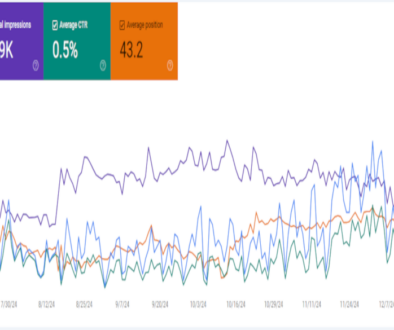In the ever-evolving world of search, staying ahead can feel like chasing a moving target. You’re constantly adjusting to new algorithms and user expectations. Maybe you’ve noticed your tried-and-true SEO tricks aren’t packing the same punch they used to, or perhaps your web traffic isn’t growing as quickly as it once did.
It’s clear – what worked last year may not cut it in 2024.
Here’s something to consider: Google’s latest AI model, Gemini, is shaking up the game by understanding more than just text – it gets code, audio, images, even video. This blog post will unwrap how this tech-savvy titan and other changes are redefining SEO strategies and search behaviors alike.
We’ll navigate through key trends and arm you with actionable insights that can transform those challenges into opportunities for growth. Ready for a glimpse into the future? Let’s explore what awaits!
2024 Search Trends To Watch
In 2024, the search landscape will continue to evolve with AI-powered search technology and Google’s new AI model, Gemini. Emphasizing quality and user experience, this shift will require a stronger focus on technical optimization and content relevance for improved discovery.
AI-powered search and significant evolution of SERPs in 2023
Search engines are evolving rapidly, and AI-powered technology is at the forefront of this transformation. Google’s Gemini now understands a mix of text, code, audio, images, and video content, reshaping how we think about search capabilities.
This innovative AI model pushes the boundaries of traditional text-based searches into new realms where multimedia content can be more easily discovered and understood.
The integration of artificial intelligence in search engine algorithms has significantly changed the landscape of Search Engine Results Pages (SERPs). Now users get answers served right at the top — think quick facts, visuals, or interactive widgets that provide information without needing to click through.
While convenient for users seeking instant knowledge, it shifts how marketers approach SEO strategy as organic listings may appear lower on the page.
Furthermore, Google’s acknowledgment that AI-generated content can be valuable sets a new standard for digital marketing. As long as this type of content proves to be relevant and offers quality insights to readers searching online shopping tips to job-search tactics or even e-commerce best practices it gains acceptance by search engines.
Artificial intelligence isn’t just supporting search queries; it’s crafting them too. Content creators who leverage these advancements will equip their SEO efforts with a competitive edge in today’s fast-moving digital environment.
Google’s new AI model, Gemini, capable of understanding text, code, audio, images, and video
As we witness the transformation of search engines with AI power, Google’s Gemini emerges as a game-changer. This cutting-edge model sets new standards for understanding digital content.
Forget about typing keywords into a search box; Gemini’s advanced capabilities mean it can decipher the full spectrum from written articles to complex programming code. Imagine asking a question and getting an answer that not only nails your text query but also brings in relevant data from podcasts, infographics, and tutorial videos.
Gemini reshapes how brands optimize for SEO by considering every form of communication available on the web. It encourages creators to diversify their content strategies to engage audiences across various media formats.
The model integrates machine learning algorithms to assess quality content, ensuring a user’s journey through Google search is lined with informative and visually appealing results.
This leap forward underscores the need for businesses to adapt their digital presence aggressively. With users seeking seamless interactions, your brand’s website must now cater beyond traditional text posts—think interactive guides, voice-assisted services, or video explanations—that are all easily crawlable and indexable by this versatile AI beast.
Moving ahead in this dynamic landscape means embracing these changes strategically in order to captivate and retain today’s discerning internet users who thrive on multimedia experiences.
Google’s stress on the importance of quality and experience in using AI models for ranking and re-ranking
Google is firmly focusing on how AI models like Gemini must deliver top-notch results while redefining user experiences. This means that any website looking to rank well needs to ensure their content ticks the boxes for relevance, expertise, and engagement.
As search engines get smarter, so too must our strategies around SEO and content creation. The spotlight is on producing material that not only aligns with what people are searching for but also provides a seamless and valuable experience once they land on your page.
Understanding this evolution becomes mission-critical when considering the next big shift – acceptance of AI-generated content. Quality remains the linchpin here; Google’s algorithms are trained to reward content that meets high standards of usefulness, regardless of its origin.
Acceptance of AI-generated content by Google as long as it is highly relevant and valuable
Google’s acceptance of AI-generated content hinges on its relevance and value. This sets the stage for a shift in content creation strategies, as high-quality and meaningful AI-generated material can now earn recognition from the search engine giant.
As we move into 2024, this presents a unique opportunity for businesses to leverage advanced technologies in delivering highly targeted and valuable content that resonates with their audiences.
This new landscape underscores the growing importance of crafting content that not only aligns with user intent but also provides genuine value, ultimately elevating the overall user experience.
Topical, entity-first strategy as a competitive advantage
AI-generated content being accepted by Google emphasizes the need for a topical, entity-first strategy as a competitive advantage. By focusing on creating content based on specific topics and entities, businesses can align with Google’s emphasis on quality and relevance.
This strategy entails understanding user intent at a granular level to craft highly focused and valuable content.
Implementing a topical, entity-first strategy involves comprehensive research into user search behavior and preferences to create content that directly addresses their needs. Leveraging AI-powered tools can aid in identifying key entities within the content domain to ensure alignment with user intent and elevate the overall quality of the material presented.
Importance of strengthening the technical foundation of the platform for improved discovery and experience
Strengthening the technical foundation of your platform is crucial for providing a seamless and efficient user experience. A robust technical infrastructure, including centralized data, component-based architecture, and secure integrations, lays the groundwork for improved accessibility and discoverability.
Fast server response times ensure that users can quickly access the information they seek, enhancing overall engagement and satisfaction. Furthermore, with search trends indicating a shift towards AI-powered answers in search results, having a solid technical foundation becomes even more imperative.
This includes aligning your platform to accommodate AI capabilities effectively while prioritizing metrics such as rich snippet visibility and on-site engagement over traditional ranking factors.
By focusing on fortifying the technical aspects of your platform, you can adapt to evolving search trends in 2024 effectively. As AI continues to play a significant role in shaping search experiences, a well-established technical infrastructure will be fundamental in delivering high-quality content seamlessly to users across various touchpoints.
7 Trends to Watch in 2024
As search continues to evolve, it’s important to keep an eye on trends that will shape the future. From SERP and visual optimization to personalized experiences and multichannel approaches, there are several key areas where businesses should focus their attention for success in 2024.
SERP and visual optimization
Google’s new AI model, Gemini, can understand a wide range of content formats like text, code, audio, images, and video. This significant advancement is reshaping SERP and visual optimization strategies in 2024.
With AI serving answers directly in search results, the competition for organic listings is becoming more challenging. As a result, typical metrics such as rankings are losing importance while rich snippet visibility, pixel dimensions, impressions, clicks, on-site engagement, and conversions take center stage in SERP and visual optimization efforts.
Incorporating these changes into SEO strategies will be crucial to maintaining visibility and relevance amidst evolving search trends. Focusing on capturing featured snippets and enhancing visual elements to stand out in the increasingly competitive search landscape will be essential for driving traffic and achieving SEO success.
Helpful content and content intelligence
Content intelligence, combined with helpful content, is a key differentiator for brands seeking to connect with their audiences. Leveraging data-driven insights allows businesses to create more relevant and personalized content that resonates with users.
By analyzing user behavior, preferences, and engagement metrics, companies can tailor their content strategies to deliver valuable and engaging experiences.
Utilizing AI-powered tools provides the advantage of understanding user intent at a deeper level, enabling the creation of content that meets specific needs and interests. This approach not only enhances user satisfaction but also contributes to improved search engine rankings.
With the increasing acceptance of AI-generated content by platforms such as Google – as long as it delivers high relevance and value – businesses have the opportunity to harness these capabilities for crafting impactful digital experiences tailored to individual users’ needs.
In summary, incorporating content intelligence into brand strategy facilitates the delivery of pertinent information while enhancing user experiences through personalized interactions.
Engagement and experience
User engagement and experience are key factors shaping the 2024 search landscape. In order to capture and retain users’ attention, personalized experiences across multiple channels are pivotal.
This means tailoring content, interactions, and messaging to individual preferences while ensuring seamless transitions between different touchpoints. Additionally, local strategies must prioritize personalization and localization to create more immersive and relatable experiences for audiences in specific geographic areas.
Furthermore, leveraging brand mentions and social proof can significantly enhance user engagement and drive positive experiences. By showcasing credibility through endorsements from satisfied customers or reputable sources, brands can establish trust with their audience and foster deeper connections.
Personalized experience
In 2024, personalized experience will be crucial for engaging users and driving customer satisfaction. The trend emphasizes the need for organizations to tailor their digital experiences to individual preferences and behaviors, providing relevant content and recommendations based on user data.
This approach requires a seamless integration of channels, robust technical infrastructure, and a deep understanding of customer journeys. Organizations that prioritize personalization will be better equipped to meet the evolving needs of consumers and gain a competitive edge in the market.
Moving forward with multichannel approach, businesses should strive for consistent engagement across various touchpoints to create cohesive experiences that resonate with users throughout their interactions with the brand.
Multichannel approach
In 2024, embracing a multichannel approach will be crucial for organizations aiming to connect with their audience. This strategy involves integrating various platforms and touchpoints, such as social media, email, chatbots, and websites, to create a seamless customer journey while measuring the right metrics.
Smart companies will prioritize training to ensure their teams can effectively navigate this diverse landscape and capitalize on the opportunities it presents.
To stay ahead in today’s dynamic environment requires not just connecting but also personalizing these channels to meet individual customer needs. This process of alignment demands an astute understanding of user behavior and intent coupled with an ability to deliver content that resonates across different platforms.
Local strategy needs to be more personalized, localized, and experiential
To stay competitive in 2024, businesses must focus on localizing and personalizing their strategies to offer experiential value to customers. By understanding the unique needs and preferences of local consumers, companies can tailor their offerings and messaging to create a deeper connection with their target audience.
Emphasizing localized content creation, such as location-specific promotions or events, will further enhance the customer experience by making it more relevant and relatable.
Implementing innovative technologies like AI-powered tools can help businesses gather insights into local consumer behavior and preferences. Leveraging data intelligence from sources like social media mentions or search queries can provide valuable information for creating personalized experiences that resonate with local audiences.
Integrating these localized strategies across various touchpoints will enable brands to engage with customers seamlessly, strengthening brand affinity and loyalty.
Brand mentions and social proof
Consumers in 2024 are increasingly influenced by social proof and positive brand mentions. These elements play a significant role in establishing trust, credibility, and authority for businesses.
With the growing emphasis on consumer perception and feedback, cultivating authentic and positive brand mentions becomes vital for standing out in the competitive market. Social proof not only differentiates businesses but also influences purchase decisions, making it imperative for brands to actively curate a strong presence through customer testimonials, user-generated content, and influencer endorsements.
Businesses need to focus on building an authentic brand image that resonates with their audience through meaningful social proof and genuine brand mentions. Leveraging these strategies will contribute to creating a compelling narrative around the brand while enhancing its overall reputation and trustworthiness among consumers.
3 Priorities for Staying Ahead in Changing Times
To stay ahead in the ever-evolving landscape of search trends, prioritizing a strong technical infrastructure, meaningful content aligned with user intent, and leveraging data intelligence for strategy and optimization are key.
These priorities will ensure a competitive edge and effective adaptation to changing search dynamics.
Technical infrastructure that enables integrated, robust experience
Investing in a solid technical infrastructure is crucial for creating seamless and integrated digital experiences. The foundation encompasses centralized data, component-based architecture, security infrastructure, fast server response, and integrations.
Prioritizing this aspect will be pivotal for businesses aiming to stay ahead in the evolving digital landscape of 2024.
Top-notch technical infrastructure lays the groundwork for delivering robust user experiences with optimized performance and reliability. With AI-driven advancements making their mark on search trends, a strong technical backbone is essential for supporting innovative features that enhance discoverability and engagement across platforms.
Meaningful content that aligns with the user’s intent and behavior
Crafting meaningful content that resonates with users’ intent and behavior is crucial for staying ahead in the ever-evolving digital landscape. In 2024, understanding user search patterns and preferences will be paramount for delivering relevant and valuable content.
By leveraging data intelligence, businesses can gain insights into customer behavior, enabling them to tailor their content to meet specific user needs. This proactive approach not only enhances user experience but also aligns seamlessly with individualized search trends.
Focusing on personalized search strategies will be essential in catering to diverse audiences across various platforms, including social media channels like LinkedIn and TikTok. Optimizing content for mobile-friendly experiences and ensuring digital accessibility will further reinforce the alignment of content with user intent and behavior.
Moreover, by incorporating natural language processing techniques, businesses can cater to diverse consumer awareness levels while adapting their strategies to accommodate individuals with impairments or those using assistive technologies.
With these initiatives in place, brands can cultivate a strong online presence that authentically engages with users throughout their digital journey.
Leveraging data intelligence for strategy, optimization, and measurement
Leveraging data intelligence is key to staying ahead in the ever-evolving digital landscape. By harnessing data insights, businesses can make informed decisions that drive strategic initiatives, optimize performance, and effectively measure outcomes.
Understanding user behavior and intent through data analysis empowers organizations to create targeted and meaningful content that resonates with their audience.
Data intelligence also plays a crucial role in optimizing digital experiences for users. It enables businesses to tailor strategies that enhance engagement and deliver personalized interactions across various channels.
With AI-enabled technology streamlining data analysis, organizations can efficiently extract valuable insights to inform their decision-making processes and overall strategy development.
Conclusion
As 2024 approaches, the search landscape continues to evolve with AI-powered advancements and a shift in ranking priorities. Keeping an eye on SERP and visual optimization, engaging content intelligence, and personalized experiences will be crucial for staying ahead.
Embracing a multichannel approach while honing local strategies will amplify brand visibility alongside social proof. As we navigate this dynamic environment, strengthening technical foundations and crafting meaningful content aligned with user intent are key to thriving in the ever-changing digital realm.
FAQs
1. What does “omnichannel” mean for search strategy in 2024?
Omnichannel refers to creating a seamless customer experience across various platforms, including e-commerce retail and social media like Instagram Reels. In 2024, it will be crucial for SEOs to optimize content marketing strategies across all channels.
2. How important is web accessibility in organic SEO?
Web accessibility ensures that websites are accessible to everyone, including those using assistive technologies like screen readers. It’s becoming increasingly important for organic SEO as search engines favor sites where information is available to all users.
3. As a recruiter, why should I pay attention to search trends like mobile-first and remote work?
Search trends often reflect the job market’s movements; with the rise of hybrid-work environments and remote opportunities, recruiters need an effective online presence optimized for mobile devices to attract job seekers effectively.
4. Are privacy controls going to impact my business strategy regarding cookie tracking?
Yes, data privacy regulations affect how businesses track customers online using cookies. Companies will have to adapt their advertising strategies with new methods that respect user privacy control while still providing insightful data.
5. Why should education about net zero and AODA compliance be part of an SEO consultant’s toolkit?
Understanding environmental initiatives like net zero and legislation such as the AODA (Accessibility for Ontarians with Disabilities Act) can enhance an SEO consultant’s advice on making web design more accessible and support eco-friendly brand messaging which improves customer experiences.
6. Can IoT devices alter how I approach my business’ search engine optimization?
IoT (Internet of Things) devices are changing how people access information through voice searches or autonomous agents, requiring businesses to adjust their content marketing including meta tags accordingly for indexing by search engines optimally.



